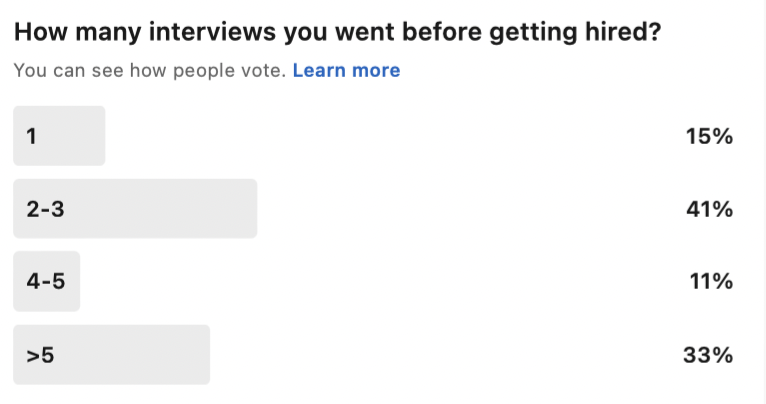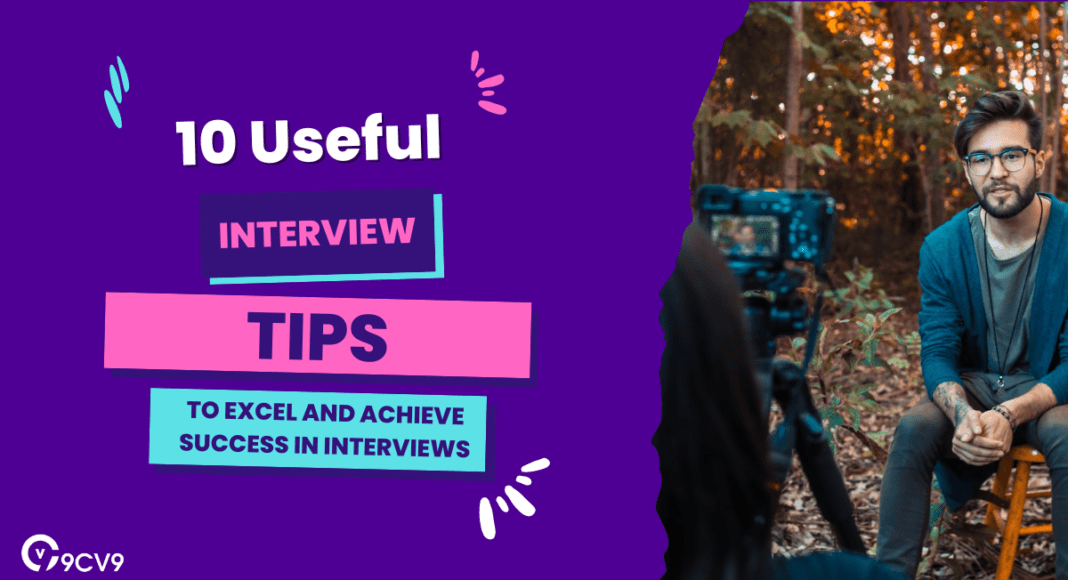An interview is a stage that most, if not all job seekers must pass before joining a company.
It is important then, to know some methods, tips, and strategies to help you to pass the interviews.
In this article, you will know how to prepare for an interview properly and to excel at them.
According to 9cv9 data, 85% of job applicants went through more than 1 round of interviews before getting hired.

Key point: Interviews will always be there when you apply for a job.
If you want to be hired at your dream company and get a higher salary or better benefits, then knowing how to excel and pass those interview rounds is crucial.
Typically, after you submit your CV to the recruiter, the company will shortlist by emailing or calling those applicants who pass the CV Screening stage to proceed to the interview stage.
This interview stage might create some nerves for job seekers.
Most are also asking about the things and questions to prepare before the interviews.
For example:
- What to prepare before the interview?
- How to make a good first impression on the interviewer?
- How long will the interview process take?
Fret not.
This article will help answer all your worries about the interview.
About 9cv9
With over six years of career and HR experience being one of the world’s best recruiting firms, and being highly involved in helping hundreds and thousands of job applicants find a better job, the 9cv9 team has distilled important learning points into this guide on excelling and getting an “A” grade in your job interviews.
Here are our best tips and tools for you to prepare, impress the recruiters, and be on your way to getting your high-salaried job.
Why Is Preparing for an Interview Important?
According to Nidirect, your CV successfully attracts the company’s curiosity (or in other words, passes the CV screening round) if you receive an interview invitation.
Therefore, you must prepare for the interview as best as possible so you will be accepted for employment successfully.
Preparing yourself before the interview is also helpful as sufficient preparation can help you not to be nervous and stiff.
It makes you able to answer questions from the interviewer confidently and smoothly.
According to Twin Employment, “40% of interviewers state that the quality of a candidate’s voice and their overall confidence” is important.
By preparing for an interview, you will feel that you are in control, i.e., be able to determine the success of the interview’s outcome in a much more confident fashion.
Also, you might be competing with many other job seeker applicants for that job offer and an employment letter from the company. According to Legal Jobs, on average, there are around 118 applicants for a job role.
Assuming that is true, then you are facing heavy competition for your application and the chance to outshine others in an interview (by being more prepared) should not be taken lightly.
Giving an excellent impression to hiring managers can increase your percentage of you being accepted at the company of your dreams.
How Long Does a Typical Interview Take?
Job seekers often ask this question.
“How long does the interview take?”
According to Legal Jobs, the ideal interview can last between 45 minutes to 1 hour.
The longer the interview time, the higher the chance of being hired as it might show that the hiring manager is keen to know you better.
You can also get to know your target company in the interview process by asking the right questions to the hiring manager or interviewer as well.
Types of Interview
A company has many types of interviews.
Usually, the hiring manager will provide details about the interview in the invitation.
However, some do not offer such detailed information.
If that happens, you can always contact the hiring managers and ask politely about the type of interview.
The following are the types of interviews that recruiters by Indeed do most often:
- One-on-one interviews
The most common interview was with one interviewer and one candidate present. This type tends to be more private and allows for more confidential and personal questions to be asked.
- Group interviews
Interviews with several candidates in one room. Helpful to directly compare the unique attitudes and answers given by the candidates. This also allows the hiring managers to observe the interactions among the candidates, like in a real-world corporate meeting scenario.
- Remote interviews:
If the candidate resides far from the company, hiring managers can use a remote interview to understand more about the candidate. This remote interview became popular in the advert of the Covid-19 pandemic.
In addition, remote interviews provide many advantages for both interviewers and candidates. The benefit is to save time and travel costs.
- Interview Panel
Whereas in a group interview, it is one interviewer to many candidates, in an interview panel setting, however, several interviewers, usually three or five, are present in one room and ask questions to one candidate.
- Walk in Interview
This is usually applicable to a retail store or a food and beverage outlet, in which the physical proximity of the job applicant to the stores is important. After sending your CV to the outlet manager, you can do an interview directly in that place.
- One Way Interview
This interview requires you to record your voice and video and upload it to the job registration form.
This one-way interview uses AI to select candidates before being called for an interview with HR.
After understanding a few things about interviews, here are ten guides for interviews that can lead you to your dream company.
10 Useful Tips to Excel and Achieve Success in Your Interviews
- Find Out About The Company and Interviewer
- Preparing Answers
- Practice Can Make You Better
- Dress Neatly
- Pay Attention to The Schedule
- Prepare the Required Documents
- Make Sure You Have Understood The Job Desk
- Prepare a Notebook and a Pen
- Make Sure Your Device Work Without Trouble (Online)
- Prepare Questions to Ask the Interviewer
1. Find Out About The Company and Interviewer
According to The Undercover Recruiter, if you have little idea of what the company does, that fall under one of the most common mistakes made during interviews.
In quantitative speak, according to Twin Employment, “47% of interviewers said that they wouldn’t offer the job to a candidate if they had little knowledge of the company“
Finding the company structure, you are applying for can make a good impression on the interviewer.
Knowing the company structure means that you are highly curious about the company and are interested in working.
According to Life Skills, you can start to find out about the targeted company from the website, social media, newspapers, etc.
Finding out the company you are applying for can also inform you about the company’s reputation and authenticity.
Besides giving a good impression, you must also be aware of fake vacancies, right?
Reading the reviews on Glassdoor or other company review websites can help to remove the fake companies from the true ones.
For example, there are scammy companies such as “Innovations Groups Philippines”, which reportedly cheated their vendors, and suppliers and imposed onerous working conditions on their employees. Have a read here.
Avoid unwanted events when you have passed the interview and were accepted to work at the company.
Want to know a winning strategy to differentiate yourself from the rest of the applicants?
Go one step further and research your interviewers for the upcoming interviews. Find out about their background, education and work experience histories, and any particularly interesting soundbites or personalities they demonstrated before. All these can be done by searching on Linkedin and news articles on the Internet.
How to find out more about the company before an Interview?
Try using Google to type the company name. Typically it will show up at the top of Google Search Results.
Else, use Linkedin to search for the company and to see it among the top results when you click “Company”
2. Preparing Answers to some Common Questions
Making a list of what interviewers usually ask can help you prepare the answers for them.
That way, you can answer interviews smoothly and convincingly.
But don’t look stiff like you have memorized the answers.
The questions asked by interviewers might have a general pattern.
Here are 9 questions that often come up during interviews, according to The Muse.
Top 9 questions that interviewers ask during interviews
- Tell me about yourself
- What are your strengths and weaknesses?
- What’s your most significant achievement so far?
- How do you deal with conflict?
- Where did you hear about this vacancy?
- Why are you interested in this company?
- What contribution can you make to the company?
- Give reasons why the company should accept you
- What are your plans for the next five years?
Try giving yourself some space and time to pour over these questions, or if you are stuck, you can discuss them with some of your friends or family.
Having more opinions and feedback on your proposed answers to those questions above can help strengthen your claim to the job and excel in your interviews.
3. Practice Can Make You Better
You can be more confident with your answers and reduce nervousness through practice.
Just be careful not to be overconfident and display signs of arrogance to the interviewer.
According to Inc, “76 percent of respondents would show a candidate the door if they appeared arrogant“. Hence, it is good to be confident and not arrogant.
Practicing answering interview questions can show your readiness and enthusiasm in the interviews.
Also, by preparing well for the interviews and thinking about common questions asked beforehand, you can avoid taking too long to think about answering the questions during the real interview.
You don’t want the interviewer to see you as a stutterer, right?
Saying too much “hmm, hmm” or blanking out before answering does not leave a good impression in interviewers’ eyes.
By the way, according to The Undercover Recruiter, “67% of bosses say that failure to make eye contact is a common nonverbal mistake.”
So when you answer the questions, do try to make friendly and natural eye contact with your interviewer.
In addition to answering questions, according to Glurecruit, you also need to practice adjusting your posture, body language, voice tone, pronunciation when answering, and facial expressions.
Our key tip is to practice in front of a mirror so you can take notice of your body cues and movements.
5 things to pay attention to when practicing:
- Make sure your posture is straight when sitting
- Don’t do body language too often.
- Use a cheerful voice tone to show that you are a passionate person.
- Make sure your words are clear and can be accessible to listening
- It would be best if you made a facial expression indicating that you are interested in this job.
4. Dress Neatly and Overdressed if need be
You need to look professional for the interview.
According to The Undercover Recruiter, 33% of bosses know within the first 90 seconds of an interview whether they will hire someone.
And if you still need some convincing, here is the key statistic:
65% indicate that clothes could be a deciding factor between two almost-identical candidates.
65%. Now that is a big number and one that is easily taken care of.
Just put effort into wearing well and dressing smart.
This is accomplished by wearing smart and neat clothes, styling your hair, and putting on formal shoes.
With the usage of online interview platforms such as Zoom, some parts of your body might not be visible during the interview and you might feel the need to not go all the way in dressing to the nines.
That said, we encourage you to still dress up fully and professionally as being well-dressed gives you confidence and reduces the risks of distraction (“what if I accidentally show my lower half during the interview”).
A neat appearance can give a good impression to interviewers when they first see you.
If you are an interviewer, you don’t want to see a candidate who looks disheveled during the interview.
Because wearing neat clothes is a basic manner in an interview. A sign that you value the interviewer who interviewed you.
Remember, a good first impression will determine whether you are accepted.
You will want the result of the interview to be a perfect 10 so dress up to score a perfect 10 beforehand.
5. Pay Attention to The Schedule
When receiving the interview invitation from the recruiter, check your schedule before replying to accept or not.
Whether on the day and date of the interview proposed by the recruiter, you can attend the interview or not.
If you cannot attend the interview, please reply to the recruiter asking if the interview schedule can be changed to a more convenient time for both of you.
Pay attention to the place and time of the interview. Make sure the address is within your traveling time allocated on the day itself. Do some research on the logistical process to travel to the interview venue and the estimated trip to the interview.
Arrive early to avoid traffic jams or things out of control that might happen.
Try to reach the interview venue around 10 – 30 minutes in advance.
Stand by at least 15 minutes in advance if your interview is online.
6. Prepare the Required Documents
If some documents are required for the interview, ensure you have prepared them in advance.
Keep all the documents needed in one folder.
Store them with care and use a water-resistant folder just in case of inclement weather on the way to the interview venue.
Typically, the recruiter will inform you ahead of the interview what documents to bring for the interview.
But if the information is less detailed, here are the documents that are usually needed for the interview according to Top Interview:
- Resume or CV
- Reference letter from the previous company (if any)
- Copy of driver’s license
- Portfolio work
7. Make Sure You Have Understood The Job Desk
If you have prepared all the answers to common interview questions, have done your company research, and practiced in front of the mirror,
But you do not understand the job desk regarding your applied job.
Then, it is simply the case of taking one step forward and two steps backward.
Knowledge of the job desk is essential to convince the interviewer to accept you even if you don’t have experience in this field.
Understanding your job desk makes the company increasingly confident that you can work well and quickly.
8. Prepare a Notebook and a Pen
Books and pens will help you jot down something important in the middle of the interview, especially for those with a forgetful nature.
According to Reed, preparing books and pens can give the impression of attention to detail, and the hunger for the job.
In addition, it can also help prevent unnecessary hand movements.
That said, it would be best if you do not record everything the interviewer says.
Write down only the essentials, such as an address, phone number, email, or mandatory-knowing rules.
The impression will not be good if you focus too much on taking notes because you are not studying in the classroom with the teacher.
9. Make Sure Your Device Work Without Trouble (Online)
According to the Gartner HR Survey, 86% of organizations are conducting virtual interviews online. So, it is very likely your company might request to send over an online interview link.
If you have the opportunity to attend an online interview, make sure your primary interview tool is functioning correctly.
Ensure your laptop, and/or smartphone camera, and microphone are functioning normally. In addition, also pay attention to the internet network.
Have both a WIFI and an Internet data network ready and working.
You don’t want to be in the middle of a network interview, experiencing lagging or even being disconnected.
Interviewers will usually use one of the video calling applications, such as Google Meet, Zoom, Microsoft Team, or Skype.
Make sure you already have an account in these applications.
If not, please create it first.
Also, learn how to use it via YouTube or by reading blogs.
Don’t waste the interviewer’s time because you don’t understand how to use the video call application.
10. Prepare Questions to Ask the Interviewer
During an interview, it’s not just the recruiter’s time to get to know you. But also you try to get to learn more about the company.
You can ask any detailed questions you want to know about the company.
That way, you will leave a favorable impression on the interviewers, who might think you are enthusiastic and interested in the company.
Here are 7 questions that you can ask according to Prospect:
- Can you tell me more details about the daily job desk?
- How can I make a good impression in the first three months?
- Is there a possibility of becoming a permanent employee after training?
- In the next five years, what will this company be?
- How is the working environment?
- Do you enjoy working in this company?
- What are the characteristics of the team?
In Conclusion
Interviews are crucial. According to 9cv9 data, on average, 85% of job applicants went through more than one round of interviews before getting hired.
Therefore, we feel obliged to set out some of the top tips and advice we have received so far to write 10 useful tips for you to excel and pass your interviews with flying colors.
The tips are to first find out about the company and the interviewers for your upcoming interview. Next, it is good to prepare answers to common interview questions and practicing to answer them in front of a mirror. Do note that dressing to “kill” is necessary to slay the interview demons.
Paying attention to your schedule and not clashing with your existing commitments are important actions to take. Do also remember to prepare any required documents and to bring along your CV at the very least to the interview venue.
Of course, it goes without saying that you need to understand the job desk and prepare a notebook and writing materials to facilitate note-taking during the interviews.
For online interviews, which are pretty common for most interviews due to the Covid-19 pandemic, it is highly advised to check and make sure all your devices are working well.
Last but not the least, prepare some questions to ask the interviewer to signify interest in the job and also to learn more about the company and the job.
Interviews need to be prepared well so that your chances of getting a job are higher.
Find out more tips about interviews on the 9cv9 blog.
If you find this article useful, why not share it among your friends and network who are going for their interviews, and also leave a nice comment below?
We at 9cv9 Research Team strive to bring the latest and most meaningful data, guide, and statistics to your doorstep.
Source:































![Writing A Good CV [6 Tips To Improve Your CV] 6 Tips To Improve Your CV](https://blog.9cv9.com/wp-content/uploads/2020/06/2020-06-02-2-100x70.png)


